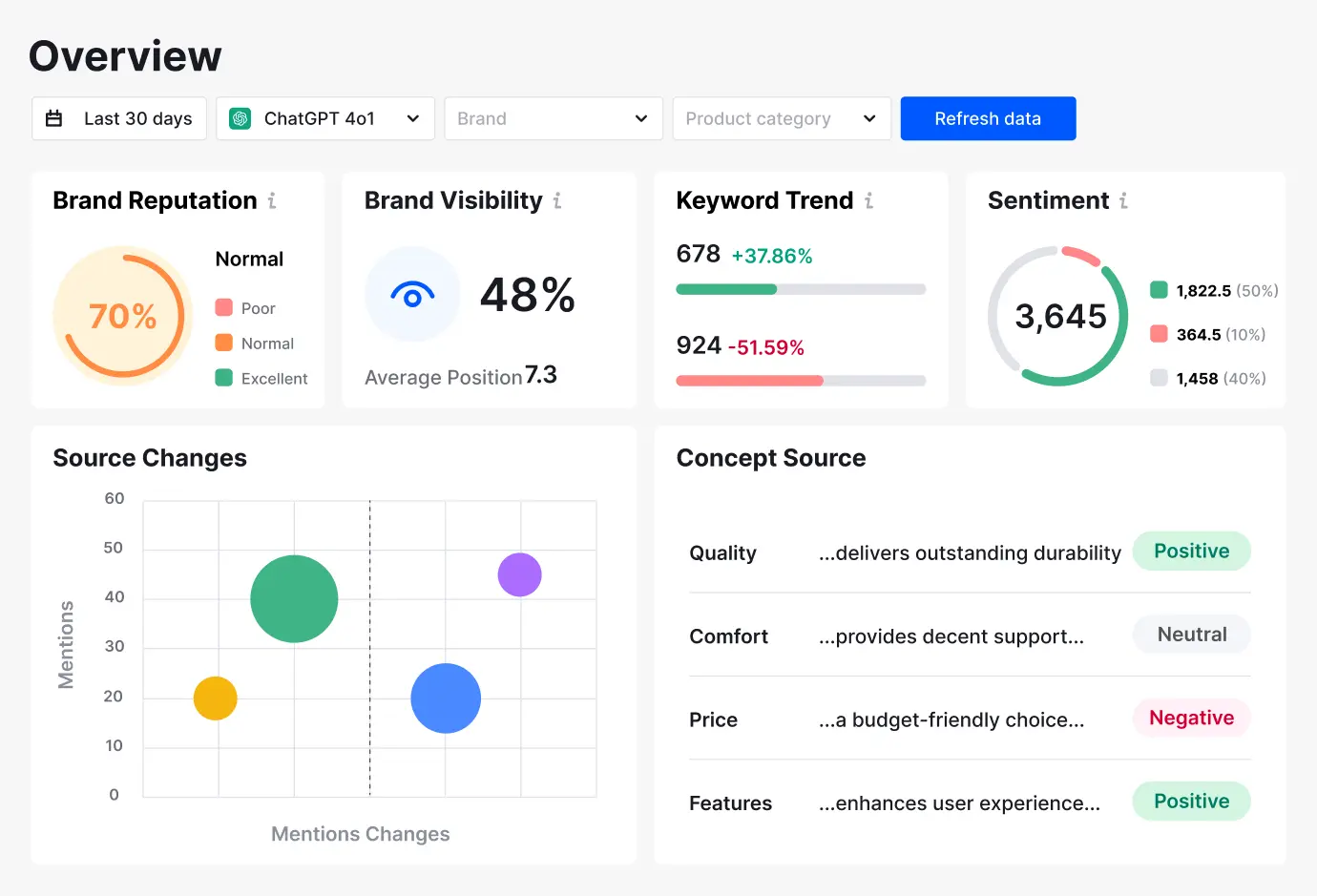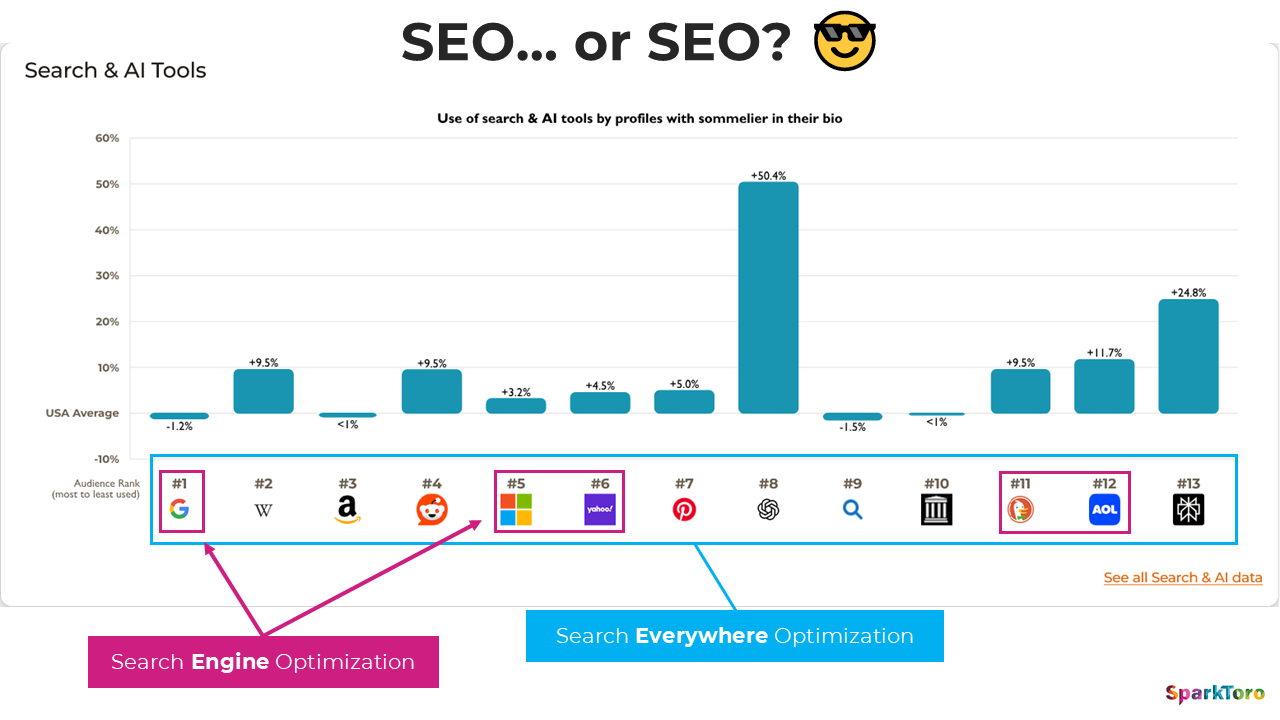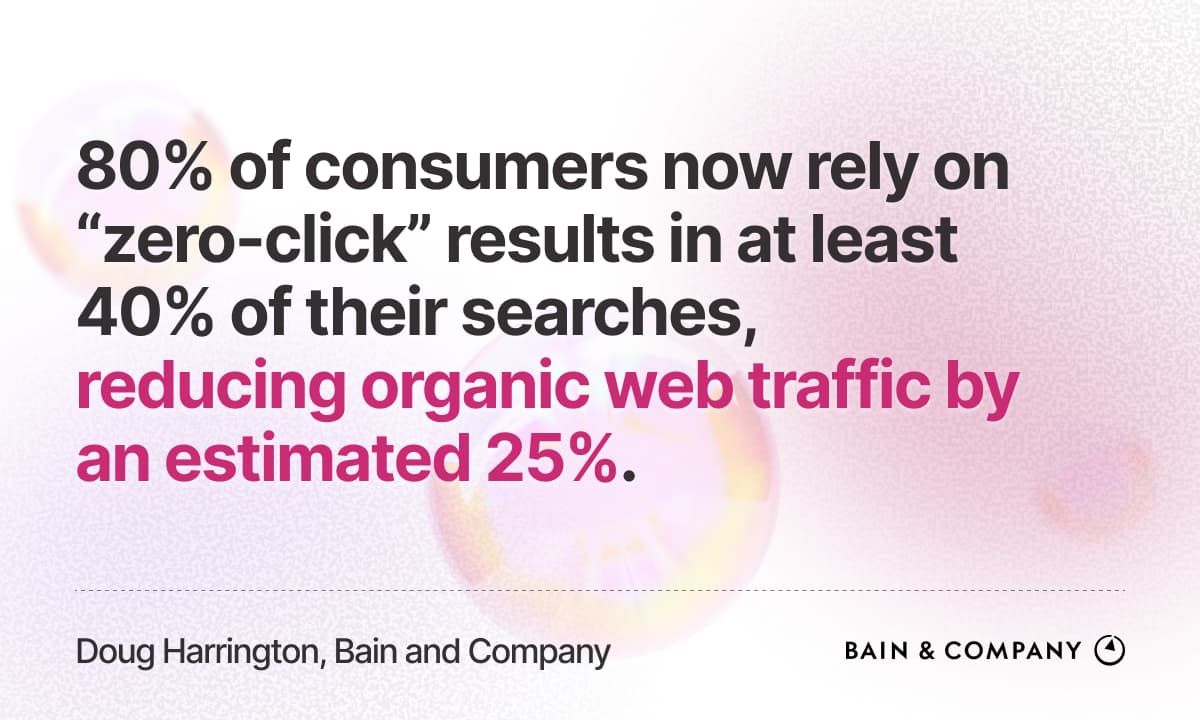The future of search is unfolding faster than ever, redefining what it means to win online attention and reshaping how digital teams and executives must think about visibility, content, and measurement in 2025.
In our recent whitepaper, “The Future of Search: Beyond Rankings and Traffic,” we distilled these shifts and provided some clear direction for those ready to lead in the new age of AI-powered discovery. If you haven’t seen it already, download the whitepaper today to discover some of the headline facts and figures when it comes to AI Search and learn more about the things you need to do to prepare for a very different future when it comes to online search and visibility.
If you have already seen the whitepaper and want to learn more, below is a summary of the key insights, future predictions, and practical action points for innovative businesses in New Zealand, the UK, and beyond.
Search Engine Evolution: From Traffic to Ubiquity
Search in 2025 and beyond is not just about climbing Google rankings. It’s about “Search Everywhere Optimisation”- ensuring brands are cited and visible wherever questions are being asked, answers are delivered, and purchase journeys begin.
AI-driven experiences (like Google’s AI Overviews, SGE, and conversational agents) are now dominant, and platforms from TikTok to ChatGPT serve as search engines in their own right. According to recent studies, over 65% of searches now end without a click, and AI-generated results are substantially reducing organic website visits, challenging traditional SEO success metrics.
If your business is not already thinking about discovery across these wide-ranging platforms, it’s not too late. Whilst there are businesses that are leading the way when it comes to discovery and visibility, there is still lots you can be doing to improve your own visibility and ensure your brand remains relevant, no matter where people are searching.
The New Metrics: Visibility and Impact

Classic rankings and web traffic are now unreliable indicators of ROI. Search is fragmented by device, platform, and context, while zero-click and AI-answered queries obscure user journeys. Today’s most valuable outcomes are:
- Cited answers within AI Overviews and summarised search
- Brand mentions and visibility on third-party platforms
- Engagement, retention, and conversion across omnichannel touchpoints
- Entity recognition and structured data powering responses in voice, text, and visual interfaces
Traditional SEO metrics such as search rankings are becoming increasingly redundant. Whilst it is still important to appear on the first page of Google’s traditional search results, monitoring and tracking progress is becoming increasingly challenging, especially with the recent update made by Google that impacts the way that Google Search Console and third-party ranking tools can monitor keyword rankings.
On September 12th, the SEO community discovered that Google had disabled the ability to use the parameter &num=100, designed to enable 100 results as the default display rather than 10.
The consequence of this change was the impact on various rank tracking providers, with many relying on this parameter in order to deliver ranking data in an efficient way, now having the potential to increase the cost of retrieving a single result by 10 times.
An unexpected result of this change was a significant change to Google Search Console data, with impressions declining dramatically for many of the properties that we have access to, also corroborated by the broader SEO community.
This shift in the way ranking results are monitored makes it even more challenging to accurately report on keyword rankings beyond the top ten. SEOs are now scrambling to find alternatives, however, for many of us in the sector, we were already starting to research visibility tools that would provide our clients with a broader understanding of their visibility across a number of channels, not just traditional organic search results.
Search Everywhere Optimisation (SEO 2.0): What It Means

SEO 2.0, popularised by Rand Fishkin, is about being “discoverable everywhere.” Instead of focusing on isolated rankings, leading brands optimise for:
- Google’s Knowledge Graph (ensuring correct, entity-rich data)
- AI and multimodal search experiences (including voice and visual search)
- Third-party environments (Reddit, TikTok, LinkedIn, Perplexity)
- Omnichannel engagement, with technical and content signals adapted for each
Being able to report on visibility in these channels is important, and that’s the challenge faced by all working in the industry as we research and assess the latest tools and find those that will provide the best insights for our clients.
Key Whitepaper Insights & Recommendations
Citation Readiness
- Optimise content structure with clear headings, concise answers, and authoritative references.
- Employ leading-edge schema markup (FAQ, Article, Person, Place, SameAs) to guide both search engines and AI models.
Answer Alignment
- Address layered user intent – exploratory to action-oriented – within a single content piece.
- Map content to real user journeys, not just keyword lists.
Knowledge Graph Optimisation
- Use structured data and entity linking to ensure your brand, products, and experts are accurately represented wherever they may be referenced.
- Standardise information across all digital channels.
Content Authority and Distribution
- Aim for citations within AI answers, not just top search positions. Feed authoritative, data-driven insights into multiple platforms where AI scrapes information.
- Prioritise unique expertise, research-based content, and credible case studies.
Technical Optimisation
- Ensure all digital assets meet Core Web Vitals and accessibility standards – AI is increasingly “mobile-first” and will prioritise technically superior sources.
- Guide AI crawlers to your best assets with LLMs.txt where possible.
Competitive Positioning
- Track not only keyword rankings, but share-of-voice in AI summaries, brand mentions in third-party answers, and sentiment analysis in real-time.
- Redefine dashboards for the new landscape: visibility, conversions, and engagement are key.
Predictions for 2025 and Beyond
- Visibility in AI-powered environments will far outweigh classic SERP rankings as a growth driver.
- Brand presence in social and conversational platforms (TikTok, YouTube, Reddit, ChatGPT) will be essential for capturing demand and trust.
- Content distribution, not just link building, will feed AI systems and drive broader digital influence.
- The “search engine” entity will be redefined to encompass not just Google and Bing, but any answer-giving AI or app, making omnichannel content and technical optimisation a must.
Action Points: What Progressive Teams Should Do Now
- Claim and optimise every critical third-party profile.
- Audit and improve structured data site-wide, focusing on schema, entity linking, and E-E-A-T compliance (Experience, Expertise, Authority, Trust).
- Leverage Looker Studio dashboards or similar tools to track visibility, not just traffic.
- Train teams on AI prompt writing, entity SEO, and voice search.
- Invest in content clusters that satisfy layered, conversational search intent.
- Shift KPIs to measure omnipresence: track answers, mentions, and branded visibility across all search surfaces.
Why Partner with Digital Hothouse?
Digital Hothouse delivers global insights with a hands-on local approach for NZ and UK brands, blending technical expertise, creative content strategy, and ongoing experimentation as the search landscape evolves. Our leadership at events like SMX and BrightonSEO, rigorous analytics, and focus on real-world client wins set us apart in delivering measurable, future-proof visibility.
Related Resources
- What to Include in Your SEO Strategy
- Geo vs. SEO
- What is AI Optimisation and Why Does it Matter for Your Business?
- Evolving Search Intent: A Glimpse Into Shifting Sands
- 5 Types of Highly Effective Blog Posts You Should Be Publishing Today
- How to Clean Up Your SEO – 7 Steps to Improve Your SEO
- AI Optimisation Services
FAQ: The Future of Search for Digital Teams
Is traditional SEO obsolete in 2025?
No, but SEO now means achieving visibility across a wide range of platforms and search surfaces, moving well beyond Google’s “10 blue links.”
How should we measure success?
Shift from traffic alone to brand presence, engagement, mentions in AI answers, and conversion metrics across multiple channels.
Can we automate content and win?
AI is invaluable for ideation and efficiency, but content authority, narrative, and credibility still require human expertise.
Should we care about lesser-known search engines and platforms?
Absolutely – omnichannel presence drives brand authority and allows your team to intercept users wherever they seek answers.
Does E-E-A-T still matter?
It’s more important than ever: Experience, Expertise, Authority, and Trust are essential signals in a world where AI systems select and summarise references for users.
For tailored support, future-proof analytics, and hands-on guidance on the next evolution of search, talk to Digital Hothouse today.
About This Series
This article is part of our ongoing series on AI Optimisation – helping business leaders, marketers, and SEO professionals in New Zealand and the UK understand how AI is reshaping search. If you want to dive deeper, check out our whitepaper The Future of Search: Beyond Rankings and Traffic and explore our dedicated AI Optimisation services page. Together, these resources will help you future-proof your visibility in a world where AI search engines deliver answers, not just links.
Download Our Whitepaper
Want a deeper dive into how AI is reshaping search?
Download our whitepaper: The Future of Search: Beyond Rankings and Traffic for practical insights, case studies, and actionable steps your business can take today.



